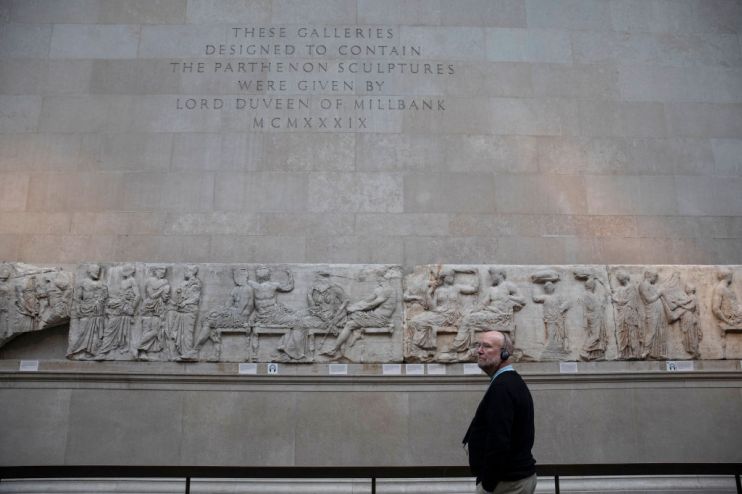Britain stands to lose more than its Marbles if it folds now

There’s a new pawn in the game of Brexit chess — 17 pawns, in fact, life-size and made of marble, plus 247 feet of sculpted frieze.
The EU sparked a panic this week, when its draft negotiating mandate revealed a clause concerning the need to address “issues relating to the return or restitution of unlawfully removed cultural objects to their countries of origin”.
This has been taken to mean the so-called “Elgin Marbles”, plundered (or rescued, depending on your point of view) from Greece in the nineteenth century, and for 188 years taking pride of place at the British Museum.
The uproar has been as vocal as it was predictable. Brexiteers are furious that the EU would even consider holding Britain hostage over “our” statues, while Remainers (if we can still use that term) are smugly arguing that such concessions are the inevitable price of leaving the bloc.
There has been a palpable sense from the latter that the Prime Minister’s tough (some might say aggressive) stance towards the negotiations and his insistence that the transition period will not be extended past December are to blame for the EU now taking a hardline approach.
But this isn’t actually a debate about Marbles. Rather, it’s a standard feature of EU negotiations.
The question of returning the Elgin Marbles (or, more accurately, the Parthenon Marbles) is hardly a new one. Greece has been pushing for their repatriation for decades, and even built a special museum for them in 2009.
There are strong voices on both sides. The returners — many of them British academics — point not only to the dubious morality of how these artefacts were obtained by the Earl of Elgin, but also to the value of people being able to see them in their original home.
The retainers cite a paper trail showing the legitimacy of removing them from Greece, and argue that had they remained in situ they would likely not have survived. They also point to the millions of global visitors who get to experience them at the British Museum each year.
At some point, the Marbles will probably make their way back to Athens. But their place on the negotiating mandate has very little to do with that debate, and everything to do with how the EU works.
This is a classic example of the difficulties the EU has negotiating trade deals, and why, however rash it seems, Boris Johnson was right to set a hard December deadline.
Basic trade deals (covering things like tariffs and competition rules) fall under the EU’s jurisdiction, and can be agreed by the EU institutions alone.
More complicated agreements that cover areas where member states retain some sovereignty (rules on visas, intellectual property, services, and data, for example) are defined as “mixed”, and require not only EU ratification, but also approval from the governments of every member state.
This means that, for comprehensive trade agreements, 27 individual governments have an opportunity to distort a deal with their pet projects.
It was inevitable that demands on Britain by member states would come thick and fast. France is pushing for tougher language on level playing field rules, visa rights are a concern for the eastern European states, and Spain has already rattled sabres about the return of Gibraltar (taking no account of the views of actual Gibraltarians, who overwhelmingly wish to remain British).
But this kind of laundry list isn’t unique to Brexit. In fact, it is exactly what happened with Ceta, the Canada-EU deal so often held up as the pinnacle of trade agreements.
After seven years of negotiation, a deal agreed by both negotiating teams was almost torpedoed at the last moment by the regional parliament of Wallonia in Belgium over niche agriculture concerns.
In Ceta’s case, the EU was not about to sacrifice a deal worth an extra €5.8bn a year, and a fudge was found. Because, as we have seen with issues ranging from the Greek debt crisis to the Lisbon Treaty, when the EU apparatus really wants something, it is able to lean on member states to drop their obstructions.
We don’t yet know if the EU establishment wants a trade deal with the UK enough that it is prepared to exert such pressure. But whatever it decides, it is in Britain’s interest to find out fast. Playing hardball and setting red lines is, in this instance, a much more effective strategy than agreeing to keep an open mind.
Because if Britain appears soft on these demands now, we can be certain that more will follow, increasing in their absurdity, complexity, or controversy.
It is better to take a firm stance and determine whether the EU leaders are prepared to have a quiet word with awkward members than spend 10 months negotiating, only to have a deal held hostage at the eleventh hour when Italy insists on licence fees for pasta or Germany decides it wants the title Britain won at the 1981 Eurovision Song Contest.
And if the answer is that the red lines of member states really are uncrossable, at least we won’t have wasted time kicking the can down the road to discover it, and can start preparing for the economic hit of leaving on “Australian” (i.e. no-deal) terms when the transition period is over.
Greece does have a case for asking for these artefacts back, and maybe, in time, Britain should listen. But if we soften now, we stand to lose a lot more than our Marbles.
Main image credit: Getty